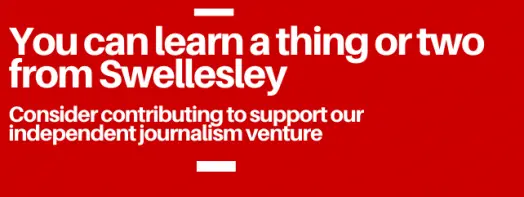Wellesley public works takeaways: Sniffing out PFAS; Still eyeing Town Meeting for stormwater plan; Watch your water usage
Since we figure a couple of you might not have watched this week’s Wellesley Board of Public Works meeting, we’ve pulled out a few highlights to share. We’re boiling it down, so check out the Wellesley Media recording for full details.
Sniffing out PFAS source
During his update on Wellesley’s efforts to solve its PFAS problem (chemicals detected in the drinking water), Department of Public Works Director David Cohen mentioned that the town is reviewing a proposal to investigate the source of PFAS in water here. It would start with a “desktop exercise,” that among other things would look at historical documents. The DPW is reaching out to Natick and Wellesley College, also affected by PFAS, to encourage sharing of information.
The point was raised during the meeting that we’re not necessarily talking about big tanks of pollutants contaminating the local water sources. You can hit the PFAS thresholds with what can amount to the weight of a handful of pennies’ worth of contaminants. So it could prove very difficult to pinpoint the source or sources, not that it isn’t worth trying.
Other items of note:
- Cohen shared the bad news that the water samples used to track Wellesley’s PFAS situation that were being handled by a third-party lab got contaminated. So the town is working with the state to ensure it stays on track with its reporting.
- Some have wondered whether Wellesley might be better off upping its use of pricey but clean Massachusetts Water Resources Authority water rather than trying to get rid of the PFAS in Wellesley-supplied water. MWRA shared an estimate of $25M to $30M to install a secondary connection to Wellesley (and nearby communities). That cost would be driven largely by the large amount of pipe that would need to be put in place, though also would include a new pump station and design. Such an installation would still be years off if the town, its municipal neighbors, and the MWRA came to an agreement to go forward.
- The Board approved a $324K contract offer for the construction portion of the interim PFAS treatment system to be used at the Morses Pond water supply. Phase I of its PFAS treatment contract is already being threatened by some delays in the production labor side of things, but nothing unexpected in this environment, Cohen warned.
- Local chemist Michael McManus, sometimes a special guest star during Public Works meetings, shared the latest on U.S. Environmental Protection Agency efforts to roll out broader PFAS tests this year. How soon that trickles down to municipalities isn’t known yet, but worth the town keeping an eye on.
Still eyeing Town Meeting for stormwater plan
Wellesley Town Engineer Dave Hickey and consultancy Tighe & Bond’s Emily Scerbo gave an update on efforts to educate the town about a possible new stormwater utility to provide a fair way for Wellesley to cover an increasingly expensive environmental cost. They stressed that the town is going to have to cover costs one way or another, and currently does so via the general tax base. But it might be fairer to break out the cost and assign it to residents, commercial entities, and tax-exempt outfits like the local colleges to make sure everyone pays a share in line with their stormwater footprint. They’ve been doing the rounds with various town boards, with the Natural Resources Commission and others on tap.
Their update to the Board of Public Works included more specifics about the possible cost to homeowners, and various ways of divvying up that cost based on the size of properties (they showed examples—and they stressed these are truly preliminary examples—ranging from a couple hundred bucks for modest-sized homes to more than $1K for McMansions). The idea would be to have those with huge properties and lots of impervious surface (driveways, pools, roofs, etc.) paying a bigger chunk. Including state property, as well as Babson College and Wellesley College, would also be key.
The DPW is still aiming to bring its proposal to Town Meeting this spring, and that could mean separate stormwater management fees going into effect as soon as July, for the following billing cycle. Expect to be hearing more about this in the months to come, including via public forums.
Miscellaneous
- Budget talk: Among other things, how to stay within town guidelines while catching up on past deferrals.
- The DPW had about 10 people out with COVID but as of the Jan. 11 meeting had everyone back in action. Cross-training was instituted to ensure the DPW would have things covered this winter in the event of more absences.
- The Recycling & Disposal Facility has made a fresh push to get people to sign up for its food waste diversion program, and 140 have signed up so far. Wellesley is looking to boost food waste tonnage by 25%, and is up more than 5% so far.
- The DPW is working to roll out an app called ReCollect to encourage more recycling.
- Expect stepped up water conservation messaging coming from the town heading into spring. Those of you whose sprinkler systems were cranking on days when you weren’t supposed to be doing outdoor watering last year? Your meters may out you, and target you with some special messaging…
